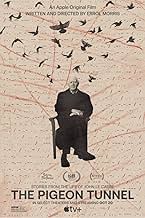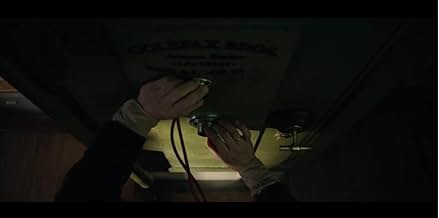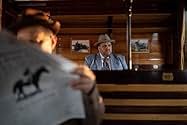IMDb-BEWERTUNG
7,0/10
2065
IHRE BEWERTUNG
Oscar-Gewinner Errol Morris enthüllt das geschichtenreiche Privat- und Berufsleben von David Cornwell, dem ehemaligen Spion, der der Literaturwelt als John le Carré bekannt ist.Oscar-Gewinner Errol Morris enthüllt das geschichtenreiche Privat- und Berufsleben von David Cornwell, dem ehemaligen Spion, der der Literaturwelt als John le Carré bekannt ist.Oscar-Gewinner Errol Morris enthüllt das geschichtenreiche Privat- und Berufsleben von David Cornwell, dem ehemaligen Spion, der der Literaturwelt als John le Carré bekannt ist.
- Regie
- Drehbuch
- Hauptbesetzung
- Auszeichnungen
- 3 Gewinne & 10 Nominierungen insgesamt
Zoltán Nagyhegyesi
- Nick Elliott
- (as Zoltan Nagy Hegyesi)
Empfohlene Bewertungen
Did you know that "The Spy Who Came in from the Cold" by a certain David Cromwell (aka John Le Carré) sold between 12-15 million physical copies? That's before Richard Burton took on the mantle of "Lemeas" from that novel and long before Sir Alec Guinness took on the part of the forensic super-spy "George Smiley" in "Tinker Tailor Soldier Spy" and that gives us quite an indication as the phenomenal success of this writer who basically bares his soul here in a one-to-one with Errol Morris. Spurred on only sparingly by the director, we are left with what is an succinct and informative retrospective on the life of a man who might not have seemed obviously destined for literary greatness. We start with his childhood where he was largely brought up by his con-man father (after his mother got fed up of the crooks and the mistresses and fled when he was five) and follows his education through Oxford, his recruitment into and ultimately boredom of the the British Intelligence community before turning his hand to bringing all of this experience to life in over twenty published novels. This isn't a treatise on how to write a thriller. It's an enjoyably structured lesson on how a little bit of experience, an understanding of human nature and a vidid imagination can create works of fiction that enthral and captivate. He delivers this with candour, humour, a tiny bit of self-deprecation but most notably - truthfulness. You need to have your thinking cap on, too. He uses language eruditely and in a considered fashion that I could listen to all day. You won't learn much about how to write a spy story, but you will learn something of this fascinating and engaging human being. It's an Apple TV production so might get only a limited cinema release (though the BBC seem to have supplied quite a bit of archive, so perhaps they secured a tx as a quid pro quo?) and it's most definitely worth a watch if you are remotely interested in the genre, in writing - or in just listening to an interesting man.
Based in part on Le Carre's book, this is a fascinating insight into the mind and works of Le Carre / David Cornwell. The documentary mixes interviews with Cornwell in a darkened library with dramatised clips, as he recalls his childhood especially his extraordinarily disreputable father who despite being a complete fraud seems to have influenced Cornwell considerably. He then goes on to explain his role in the secret service and the seemingly deranged minds of those around him, including Kim Philby who seem to thrive on deceipt. Thereafter he has used this knowledge, his fertile imagination and his childhood experiences to craft so many great spy novels.
It is all thoroughly absorbing helped immeasurably by the man himself whose warm treacly erudition cannot fail to keep you entertained. It is interesting that this smooth manner must have helped a lot when he was interrogating and you therefore wonder when being 'interrogated' himself by filmmaker Errol Morris whether everything he claims is true, actually is - he is after all an expert on deception.
The Pigeon Tunnel title is explained at the beginning of the film and goes some way to explaining why most of his books start off being called The Pigeon Tunnel.
It is all thoroughly absorbing helped immeasurably by the man himself whose warm treacly erudition cannot fail to keep you entertained. It is interesting that this smooth manner must have helped a lot when he was interrogating and you therefore wonder when being 'interrogated' himself by filmmaker Errol Morris whether everything he claims is true, actually is - he is after all an expert on deception.
The Pigeon Tunnel title is explained at the beginning of the film and goes some way to explaining why most of his books start off being called The Pigeon Tunnel.
As "The Pigeon Tunnel" (2023 release; 93 min) opens, Le Carre and the film's director Errol Morris are discussing the making of this film (supposedly the last interview LeCarre ever gave). LeCarre (real name: David Cornwell) then reflects on his upbringing, which he admits was anything but easy. At this point we are 10 minutes into the documentary...
Couple of comments: this is the latest documentary from Oscar-winning director Errol Morris ("The Fog of War"). Here he reassesses Cornwell/Le Carre's life and times. And how does Morris exactly do that? For the most part he simply lets the interviewee do the talking. It's almost as if we get a glimpse of what Le Carre is such an accomplished writer. The movie is at its best when Le Carre explains how his own real life experiences as a spy for the British secret service influenced the novels he wrote. Morris uses film clips to illustrate various points. At a certain point, it blurs the lines of what is real and what is fiction. I found is rather fascinating. THe movie also benefits tremendously from the delightful original score by Philip Glass and Paul Leonard Morgan, who has scored several earlier Morris documentaries.
"The Pigeon Tunnel" premiered at the Telluride Film Festival in early September, earning immediate critical acclaim. There is good reason why this movie is currently rate 95% Certified Fresh on Rotten Tomatoes. The movie just started streaming on Apple TV. If you are a fan of John Le Carre or of Errol Morris' earlier documentaries, I'd readily suggest you check this out, and draw your own conclusion.
Couple of comments: this is the latest documentary from Oscar-winning director Errol Morris ("The Fog of War"). Here he reassesses Cornwell/Le Carre's life and times. And how does Morris exactly do that? For the most part he simply lets the interviewee do the talking. It's almost as if we get a glimpse of what Le Carre is such an accomplished writer. The movie is at its best when Le Carre explains how his own real life experiences as a spy for the British secret service influenced the novels he wrote. Morris uses film clips to illustrate various points. At a certain point, it blurs the lines of what is real and what is fiction. I found is rather fascinating. THe movie also benefits tremendously from the delightful original score by Philip Glass and Paul Leonard Morgan, who has scored several earlier Morris documentaries.
"The Pigeon Tunnel" premiered at the Telluride Film Festival in early September, earning immediate critical acclaim. There is good reason why this movie is currently rate 95% Certified Fresh on Rotten Tomatoes. The movie just started streaming on Apple TV. If you are a fan of John Le Carre or of Errol Morris' earlier documentaries, I'd readily suggest you check this out, and draw your own conclusion.
Director Errol Morris has made some pretty great documentaries in his career like "The Thin Blue Line, A Brief History of Time, and Fog of War" as Morris provides some interesting insightful documentaries and stories. With this one focusing on the career and life of John le Carré, Morris takes an interesting look of Carré's personality, career and the outlooks of the Cold War era and for the most part, it was solid.
John le Carré being the main subject provides some good and interesting conversations and discussions about his ideas and career with some pretty interesting dramatic reenactment moments to demonstrate the setting and environment. Throughout, the production was solid with the camerawork being good although nothing too special about it's presentation and colors. The conversations between Morris and Carré are strong as if there was good chemistry between the two of them.
However, the engagement wasn't the strongest as since topics about spy career isn't my most favorite genre of literature, there were some pacing moments that did feel a little sloppy that made certain subjects feel uninteresting to discuss about. There were certain discussion moments that I wished they had focused a little on more. The soundtrack does end up getting obnoxious as the soundtrack distracts certain moments.
Overall, it's an interesting documentary but it's not my favorite from Morris.
John le Carré being the main subject provides some good and interesting conversations and discussions about his ideas and career with some pretty interesting dramatic reenactment moments to demonstrate the setting and environment. Throughout, the production was solid with the camerawork being good although nothing too special about it's presentation and colors. The conversations between Morris and Carré are strong as if there was good chemistry between the two of them.
However, the engagement wasn't the strongest as since topics about spy career isn't my most favorite genre of literature, there were some pacing moments that did feel a little sloppy that made certain subjects feel uninteresting to discuss about. There were certain discussion moments that I wished they had focused a little on more. The soundtrack does end up getting obnoxious as the soundtrack distracts certain moments.
Overall, it's an interesting documentary but it's not my favorite from Morris.
This would be of particular interest if the viewer enjoyed the authors fiction which I did. This is a remarkable movie about a remarkable author living in Cold War times.
LeCarré somehow manages to capture the colour of the paint (tobacco brown) on the walls of the meager interrogation rooms and offices in his prose, and the underlying violence is subtle and implied rather than evident. And although there are sides to take his writing never demands this of the reader.
His skill in capturing the zeitgeist of the Cold War years is his brilliance which somewhat diminishes in the post war era when he still continues to shine in a more contemporary way.
See the video, LeCarré is the star.
LeCarré somehow manages to capture the colour of the paint (tobacco brown) on the walls of the meager interrogation rooms and offices in his prose, and the underlying violence is subtle and implied rather than evident. And although there are sides to take his writing never demands this of the reader.
His skill in capturing the zeitgeist of the Cold War years is his brilliance which somewhat diminishes in the post war era when he still continues to shine in a more contemporary way.
See the video, LeCarré is the star.
Wusstest du schon
- Zitate
David Cornwell: I wasn't a dupe; I was invited to dupe other people.
- VerbindungenReferenced in Film Junk Podcast: Episode 917: Priscilla (2023)
Top-Auswahl
Melde dich zum Bewerten an und greife auf die Watchlist für personalisierte Empfehlungen zu.
- How long is The Pigeon Tunnel?Powered by Alexa
Details
Box Office
- Weltweiter Bruttoertrag
- 44.996 $
- Laufzeit
- 1 Std. 32 Min.(92 min)
- Farbe
Zu dieser Seite beitragen
Bearbeitung vorschlagen oder fehlenden Inhalt hinzufügen




























